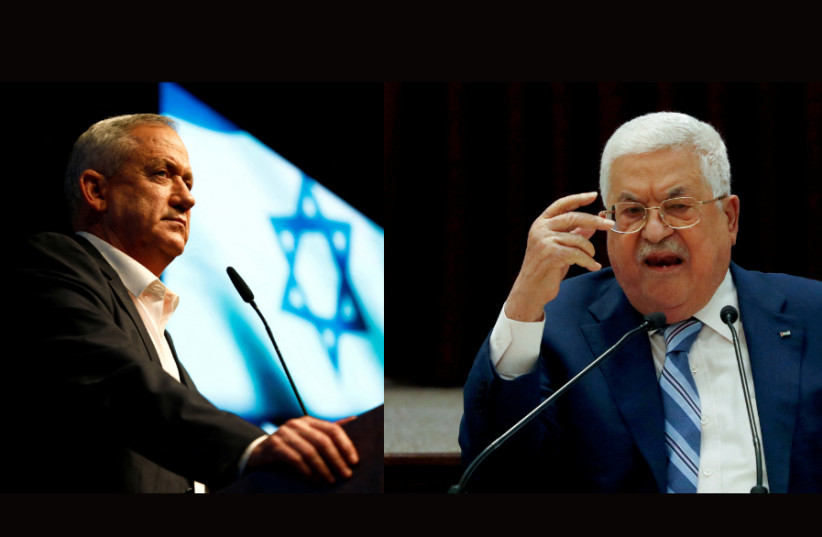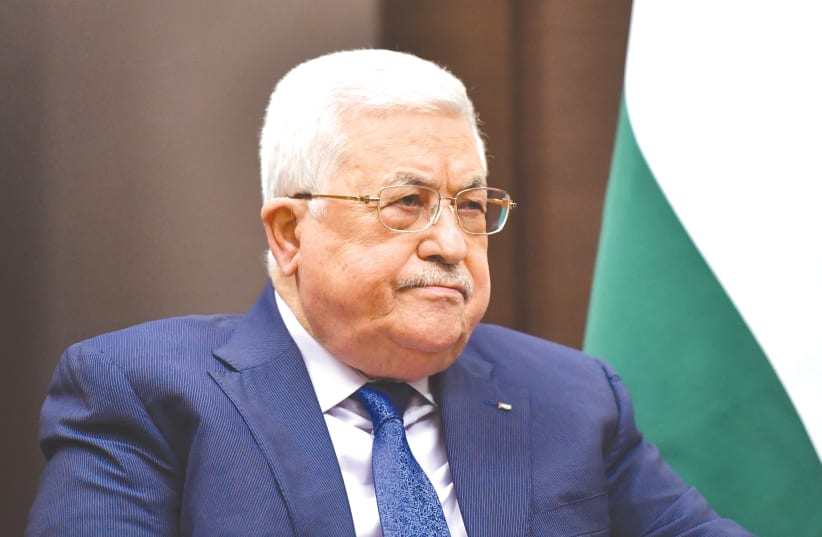Palestinian Authority President Mahmoud Abbas wants to see a stable West Bank and is not interested in an escalation of violence, the Coordinator of Government Activities in the Territories Major-General Rassan Alian told army radio on Thursday.
“Abu Mazen [Abbas] is very interested in security stability and is not interested in [a violent] escalation,” Alian said.
Alian spoke in the aftermath of a rare meeting at Defense Minster Benny Gantz’s home in Rosh Ha’ayin with Abbas, in which Alian was a participant. Abbas and Gantz also met in Ramallah in August.
The Right has harshly criticized Gantz for speaking to Abbas. At issue, in particular, is the PA pursuit of war crimes suits against Israelis at the International Criminal Court, as well as the PA policy of providing monthly financial stipends to terrorists in Israeli jails and to the families of slain terrorists.
Both Gantz and PA General Authority for Civil Affairs Hussein al-Sheik, who was also in Rosh Ha’ayin, have characterized the meeting as a necessary step in light of the growing potential for Israeli-Palestinian violence.


Alain also underscored that point when he spoke with Army Radio.
“There is tension on the ground,” he said, describing both PA and the IDF as bodies that sought to restrain minority extremists groups from causing a violent outbreak in the West Bank.
“The Palestinian Authority, in general, is a responsible political entity... that provides civilian and economic services throughout Judea and Samaria,” he said.
It has a “significant role in maintaining peace, security stability, and normal civilian life within Judea and Samaria for the Palestinian public that lives there,” said Alian.
The PA has auspices over Palestinians living in Areas A and B of the West Bank, as well as over the PA security services that operate in that area.
Alain’s COGAT office controls the Civil Administration, which has civilian oversight of Israelis and Palestinians living in Area C of the West Bank.
Both the PA security services and Israel work in coordination to keep a lid on West Bank violence. This week PA security forces foiled two attempts by Palestinians to torch Joseph’s Tomb in Nablus, otherwise known as the biblical city of Shechem.
The IDF-PA security coordination has weathered all political and violent crises between Israel and the PA, and is one of the fundamental cornerstones of West Bank stability.
Alian acknowledged the need to balance steps taken with respect to helping the PA versus those taken to ease conditions for Palestinians in Gaza, ruled by Hamas.
Israel does not want to “create a situation in which it may mistakenly or indirectly strengthen Hamas at the expense of the PA,” he said.
All meetings between Israeli and Palestinian security officials help strengthen security coordination with the PA, including of course the Gantz-Abbas meeting, Alian said.
In Tuesday’s meeting, “each side wanted its counterpart to restrain its population,” he said. “Both sides can avoid unnecessary friction between the populations.”
Unfortunately, there is a small handful of Israelis who have undue influence over the situation, Alian said, referring to Jewish extremists.
Both the IDF and the PA “understand the dynamics” and “will work hard to curb their side.”
At the meeting, Gantz promised the PA a NIS 100 million loan and to legalize the status of 6,000 Palestinians in the West Bank and 3,500 in Gaza.
Sheikh tweeted on Thursday that “within hours, we’ll announce the names of the first batch of family #reunification in our beloved #Gaza, and it exceeds 3,200 (three thousand and two hundred) names. Congratulations to these families as we move forward in building our country and people. Long live #Palestine.”
The US, the European Union and the United Nations have all lauded the meeting, during a time when there is no peace process on the table.
During former prime minister Benjamin Netanyahu’s 12-year tenure, all such conversations ground to a halt. Abbas last visited Israel for a high-level meeting in 2010.
European Union Special Representative for the Middle East Peace Process Sven Koopmans tweeted, “Glad to see reports of another meeting between President #Abbas and Defense Minister Benny Gantz. Urgent, substantive and structural measures are needed for the benefit of Palestinians and Israelis; therefore investing in personal relationships is necessary and inherently positive.”
Glad to see reports of another meeting between President #Abbas and Defense Minister @gantzbe. Urgent, substantive and structural measures are needed for the benefit of Palestinians and Israelis; therefore investing in personal relationships is necessary and inherently positive.
— Sven Koopmans (@EUSR_Koopmans) December 29, 2021
UN Special Coordinator for the Middle East Peace Process Tor Wennesland wrote, “ High-level dialogue is essential for addressing the urgent security and economic challenges and charting a path back to dealing with key political issues.”
The German Foreign Ministry said that “Personal contacts & talks about confidence-building measures are crucial for further cooperation & to reduce tension. We hope 2022 sees more progress on this path, which Germany is ready to support.”
